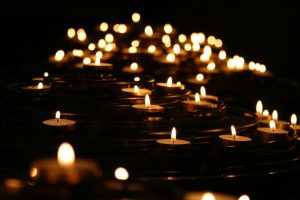Several of my dearest friends have lost loved ones recently; other friends have faced difficult anniversaries of loss. This has been an especially challenging time for many of my favorite people. I want to send special love and thoughts of support and hope to all of you who have suffered great losses recently, or who lost loved ones or relationships some time ago but still feel the sting of those losses every day.
Even after estrangements or difficulties, or when death is expected, such losses can be extremely difficult and sometimes surprisingly destabilizing to our mental and physical health. Even if a friend or family member was challenging, or if we were no longer close, facing their deaths usually makes our own lives feel more fragile. We can also feel as if we’ve lost a part of our own histories when they leave this world. When we lose another person (or an animal friend) who has witnessed important times in our lives, we may feel as if we’ve lost those times forever, and given up a part of ourselves, too.
But we still carry those people, companions and experiences in our hearts, and our relationships with them don’t die when their bodies stop breathing. Our relationships can even grow over time as we gain new insights into their behaviors or their pains or fears. We may grow to forgive, or even to get angrier for them for the way they behaved—and that’s okay. It takes time to process and understand relationships and feelings. We may even think we’ve finished grieving for them and find that a wave of great sadness and loss overcomes us at strange times, scaring us with the strength of our emotions. That is normal, too.
If you have suffered a great loss and the weight of it is still heavy or the pain feels very fresh, I am so sorry. Though time does ease it, getting to a point at which memories feel more pleasurable than painful can take much longer than we expect, and working through grief is exhausting. For now, I hope you will ask less of yourself for the time being, while your suffering is fresh. The stress of grief is one of the greatest stresses a body can bear, so allow yourself time to rest and recover from the shock of loss. Treat yourself as you would treat any dear friend who was in pain—with extra sleep, nurturing food, enough quiet time, and, when necessary, comforting distractions. Emotional breaks are important, and finding moments of lightness or laughter during times of grief does not make you disloyal to those whom you have lost. There is no timetable that you must follow in order to be “normal” or “right”—take your time, get your rest, and don’t feel guilty if you need extra time away from others, or if you can’t respond to others’ kindnesses as quickly as you’d like.
Remember that you are loved, and that those whom you love don’t disappear from your life as long as you carry them with you in your heart. Sharing what you love most about them with others can be healing, and it can pass their goodness along to others; I still speak of my grandmother’s love and grace frequently, and it comforts me and makes my daughter feel close to Grandma Emma, even though they never met.
You are not any less valuable or lovable just because those who have loved you deeply are no longer near you. You will always matter, and so will they.
Photo by Mike Labrum, Unsplash

